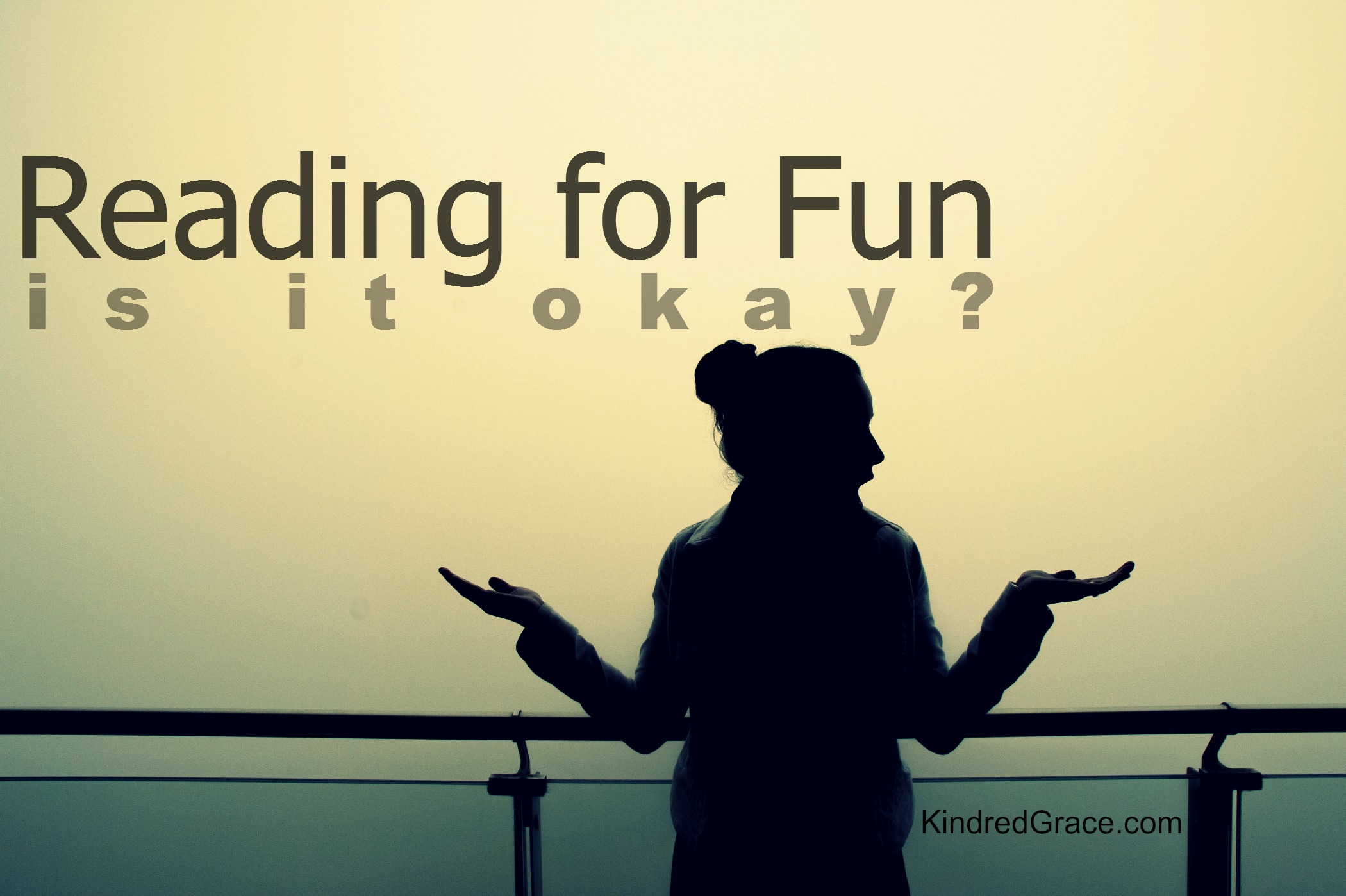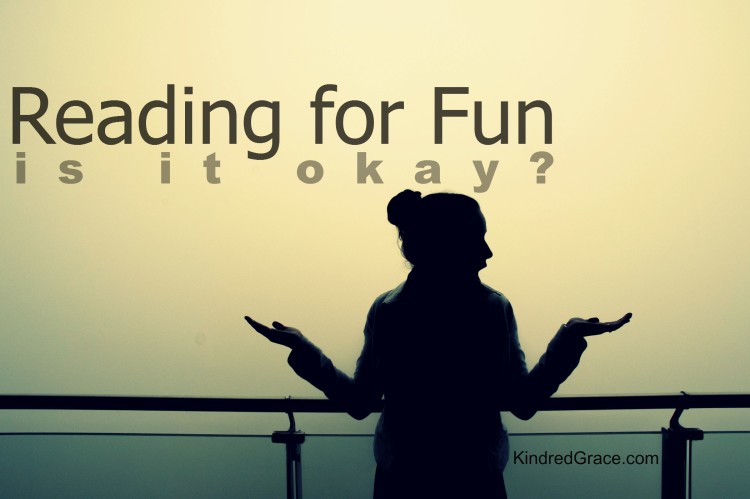Reading for Fun: It’s OK
Reading had become a chore. As odd as it sounds, that’s what happened. I had spent the majority of my childhood identifying “reading” as my foremost hobby, I had voraciously devoured multiple books a week, and had routinely won the local library’s summer reading program. Somewhere along the way, my default leisure activity switched to movies and TV shows; instead of picking up a book when I had downtime, I started doing anything except read. In retrospect, the switch came sometime after arriving at college and that season of academic pursuits. As the reading assignments piled up (I calculated once that I was assigned more than 250 pages per week — and sometimes that was just one class!), the one hobby I consistently loved became another bullet point on my task list and eventually became a chore instead of a hobby.
In the mix of intelligent friends, self-imposed ideals, and unrealistic expectations, I came to believe that I could only read a book if it were academic, thought-provoking, or instructional. So I didn’t read at all. Ever. It was just too much work. Or, if I chose to read something “fun” (definition: non-academic, generally fiction), I would feel guilty. Guilty? Yes, guilty. Guilty that my brain wasn’t being used to “full potential,” guilty that I was “just” reading a novel, guilty that I wasn’t reading a book that I could discuss intellectually at a cocktail party later.
Why do I read? What makes a book worth reading? If I can only read “certain” books, is it out of pride, so I can quote a prestigious book and earn gold stars from my intellectual friends? If I refuse to read novels, am I a “better” person than the reader who enjoys reading for pleasure and not academia? NO and no. Reading for fun is not only okay, it’s good.
1. Reading is reading, no matter how intellectual it is.
I can’t deny it: after heavy reading in college, my brain has needed a break. Not reading was a good start to that break. Reading novels is a completely valid continuation of that break. Just because it isn’t “deep”, doesn’t mean it isn’t helpful. I travel to new worlds, explore new time periods, and embrace new cultures just by opening the pages to a book. I read a novel and evaluate elements of writing and critique styles of communicating. In short, I hone my skill as a wordsmith no matter which book I explore.
2. Learning comes in unexpected ways, even in a novel.
It’s odd to realize, but sometimes I glean the most life-impacting, helpful truths straight from modern Christian historical fiction. The sentences might be run-on, the metaphors cliched, and the plot predictable, but God can use a thought, a Scripture, a perspective even in the novel. Did you see that? Even in a novel, God can work in me. And have you noticed what deep truths there are in children’s board books? Go look! I might not be reading the biography of a world changer, but I’m reading truths that can change my world.
3. Reading can be a way of rest.
Rest is a biblical ideal. We’ve all heard how God worked six days to create the earth and then rested. But do we really apply it? I know I don’t. Reading fun novels is a form of relaxation for me, but I feel like it’s time I ought to be spending more “productively”. And there it goes again, that guilt cycle. But, ultimately, reading is productive because it’s restful, and I don’t have to feel guilty over rest.
I read to enjoy explore the world without leaving my house. I read to gain perspective and remember Truth. I read to relax. Why do you read?



I have wondered this myself. Especially during college years (they’re almost over!) when I’m reading THICK stuff most weeks/days/hours…and as some of my friends have decided to forego novels or just romances for various reasons.
Loved this breakdown on the beauty of books, the power of words even read for fun…:) Thanks you!
Yep. Right before this article was posted, I actually found the peace I needed to just sit and read. Definitly a relaxation! And yes. It is okay to read for fun! (I occasionally have to shout that at my inner perfectionist 🙂
Thank you, Jenni! I had a very similar experience with feeling guilty about reading for fun, only it started in high-school with mom who repeatedly said, “get up and do something!”. Follow college close on its heels with so much academic reading, and I was tired. The last thing I wanted to do when I had time to relax was pick up a book. I put the Lord of the Rings trilogy and the Anne of Green Gables series on my to-read list and rediscovered my love for books. 😉 Just this past January, tired out with unmet goals for the previous year, I turned again to children’s fiction. Nesbit’s dragon and fairy stories brought the enjoyment back. God gives creativity, and reading fiction is (for me) taking delight in that good gift.
I can totally and completely relate! I too devoured books as a child and teenager, but then college completely changed that thought…if I added it up, I could probably say I was assigned more than 250 pages/week for some of my semesters, so I began to hate books. Now, while I’m still in college online (pursuing higher degrees), I have to force myself to read for enjoyment. While I enjoy reading when I take the time, I find myself thinking of more important things to do than read. I realize that I’m going to have to just create basically a to-do list of books for myself. Thanks for the gentle reminder that reading is beneficial, fun and completely ok to only be for entertainment!
Good reminder! After I graduated I, too, had to reclaim the ability to read for fun. Though, usually the first thing I did when I went home for break was paint a picture and demolish a short fluffy historical romance.
That said…..*Anything* you read can be discussed intellectually–because if nothing else there are always the questions of why you read it, what made you pick it up, and what made you finish it. Frankly I find novels, even *gasp* secular novels incredibly fascinating, educational and spiritually challenging (sometimes for the aforementioned reasons) . Biography, history, and philosophy are all important things, but nowhere are they more on display than in fiction. Fiction is the outworking of philosophy and the times in which it was written (perhaps moreso than the times in which it is set).
I majored in Literature because I wanted to learn how to write, and I hated almost all the things I had to read. Until my senior year when I took a course called Worldviews in Literature and suddenly, finally, understood a valid reason for reading all those hideous stories. So I guess I approach all books a little strangely now!
This was great! I think I’m going to share it on my business page. I write gritty, adventure novels, and sometimes people ask me if writing or reading fiction is Godly. Maybe this article can help them. Thanks!
Thank you for the great perspective! As a mom, I don’t have the same amount of time to read as I used to, so I usually prioritze non-fiction, theologically dirven books. Lately, I’m realizing that my artist heart craves good fiction. There is still plenty of potential to learn and a beautiful novel inspires my writing style. So… Why do I read? I think primarily to rest and draw near to the Lord. 🙂